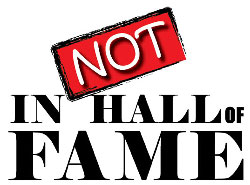
Committee Chairman
Kirk Buchner, "The Committee Chairman", is the owner and operator of the site. Kirk can be contacted at [email protected] .
Don Coryell: 2015 HOF Finalist
Jan 17, 2015
Published in
Hall of Fame Debates
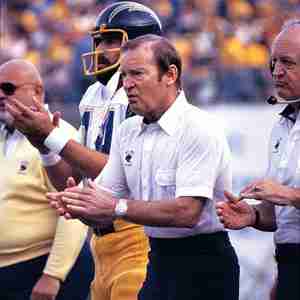
Having a lot of fun doing our Baseball debates with two of my bloggers, DDT and the Phillies Archivist, I wanted to repeat the same idea with this year’s Football Finalists, but due to time constraints I will take a deeper look at each candidate myself and offer a few thoughts as to their Hall of Fame candidacy
Next, I take a look at former Head Coach, Don Coryell.
This is actually the easiest debate as the Hall of Fame case for Don Coryell always comes down to the same question: Innovation Vs Success.
Seriously, it is that simple.
Coryell was dubbed “Air Coryell” for a putting a higher premium on the passing game, and creating a unique rhythm forcing defenses to cover all parts of the field. Tight Ends, Running Backs would go in motion, Receivers had no set start point, and the ball would be going to the target before the receiver would get there. Coryell made deep routes a major part of his offense and altered the way Tight Ends were played, making them a bigger part of offensive targets. All of this is commonplace today but this was not happening before Coryell literally changed the way the game was played.
He would begin this revolution with the St. Louis Cardinals where he would win two consecutive division titles, but it was in San Diego where he had the Quarterback he wanted (Dan Fouts) that he was really able to bring his vision to light. His Chargers would win the division three times and would lead the National Football League in passing six consecutive seasons, which remains a record today.
That’s the positive side of the Hall of Fame ledger, which has been enough to keep him on the ballot for a few years now; here is the negative.
Coryell did take his teams to the playoffs often but only has a 3 and 6 record and does not have any Super Bowl rings, generally a prerequisite for a Hall of Fame induction. His regular season record is 111-83-1, which is decent, but is not spectacular.
However, the biggest and fairest criticism of Don Coryell was his lack of attention to defense, and even past Defensive Coordinators would state that he had limited interest in that side of the ball. That did show in the teams he coached, as they were routinely on the bottom half of points and yards allowed.
So there you have it. The ultimate case of innovation Vs Accomplishment.
Personally, I am all about innovation, though my glasses are tainted somewhat by looking at other Halls of Fame and how they induct players/musicians and when you are a game changer, I believe you should get in.
Will he this year?
Probably not.
Morten Andersen: 2015 HOF Finalist
Jan 15, 2015
Published in
Hall of Fame Debates
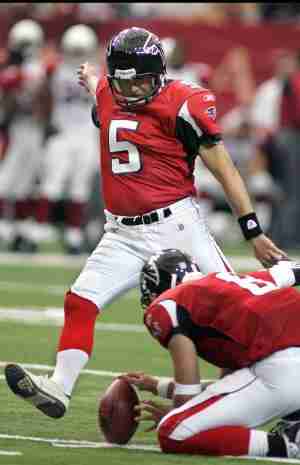
Having a lot of fun doing our Baseball debates with two of my bloggers, DDT and the Phillies Archivist, I wanted to repeat the same idea with this year’s Football Finalists, but due to time constraints I will take a deeper look at each candidate myself and offer a few thoughts as to their Hall of Fame candidacy
Next, I take a look at former Place Kicker, Morten Andersen.
I have to admit I was surprised that Morten Andersen was a Hall of Fame Finalist last year. It isn’t that there are not some serious Canton worthy credentials, he does, but since it’s inception the frequency in which they have elected Special Teams players has not exactly been regular.
Punter, Ray Guy had a long wait to get into the Hall, and had to wait until he was a Senior Nominee before he finally got the Hall; this despite being regarded by every football pundit as the greatest Punter in the history of the game. It has been a little easier for Place Kickers…but not much.
There are players in the Pro Football Hall of Fame who have a significant amount of PATs and Field Goals made but these were players (George Blanda for example) that had a significant amount of playing time at other positions. The only full time Kicker in Canton is Norwegian born, Jan Stenerud, so would not seem somewhat fitting that a fellow Scandinavian (Andersen was born in Denmark) join him?
Andersen is currently the all-time leading scorer in NFL history and is 398 Points ahead of the 42 year old Adam Vinatieri, and if he can’t catch him, he will hold that record for a considerable amount of time. Normally, the leading scorer in any sport would be a lock for a Hall of Fame, but American Football doesn’t work that way, so that by no means makes him a lock.
The “Great Dane” also is the all-time leader in Games Played, and consecutive Games Played and Field Goals Made and is also the all-time leader for both the New Orleans Saints and the Atlanta Falcons. In addition, Andersen went to seven Pro Bowls and made three First Team All Pro squads.
Adam Vinatieri had that signature moment when he kicked a forty-five yard Field Goal in the snow to tie a 2002 playoff game against the Oakland Raiders (the infamous “Tuck Rule” Game) and a much shorter one to win the game. Vinatieri would also kick the game winning in that year’s Super Bowl, and instantly he became the most famous Place Kicker in the NFL and actually received endorsements, unheard for a Kicker.
Andersen himself had a signature playoff moment while playing for the Atlanta Falcons when his 38 Yard overtime Field Goal in 1999 took Atlanta to the Super Bowl, though unlike Vinatieri, his team was not able to capitalize on the big one.
Should the fact that Morten Andersen never won a Super Bowl keep him out of the Hall of Fame? Not at all, Andersen did what was required of him in clutch situations, which is all you can ask of your clutch kicker, but it does make Vinatieri a sexier candidate, and if Andersen is still lingering on the ballot, he could be overlapped.
Saying that I don’t think that Andersen will still be there, but I don’t think that he is getting in this year, though I do predict he will eventually be the second pure Place Kicker in the Pro Football Hall of Fame.
Orlando Pace: 2015 HOF Finalist
Jan 13, 2015
Published in
Hall of Fame Debates
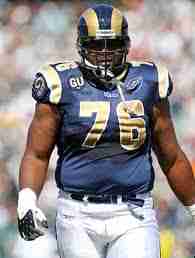
Having a lot of fun doing our Baseball debates with two of my bloggers, DDT and the Phillies Archivist, I wanted to repeat the same idea with this year’s Football Finalists, but due to time constraints I will take a deeper look at each candidate myself and offer a few thoughts as to their Hall of Fame candidacy
First up, I take a look at former Offensive Tackle, Orlando Pace.
You had to know that the St. Louis Rams “Greatest Show on Turf” team was going to have multiple names make this year’s finalists. Along with Kurt Warner, Isaac Bruce and Torry Holt, Pace was one of four members of the Super Bowl XXXIV Championship team that became eligible all in the same year. Personally, I thought that either Bruce or Holt would join Warner and Pace, but perhaps those deciding the fate of the Finalists thought that two Rams were sufficient or maybe Bruce and Holt cancelled each other out.
That aside, when you talk about those great Rams teams, the names of Warner, Marshall Faulk, Bruce and Holt received the press, as you would expect; skill positions always do, but would St. Louis have been as good without Orlando Pace helming the Offensive Line?
Protecting Warner and opening up gaping holes for Faulk, Pace gave the Rams exactly what they hoped for when they selected him first overall from Ohio State in 1997. In the twelve years that he played for the Rams, they had more gross yards than any other team in the National Football League and he blocked for three consecutive MVPs (Warner twice and Faulk once).
Legacy wise, Orlando Pace is regarded as one of the three Left Tackles of his era who were considered among the elite; the others being Walter Jones and Jonathan Ogden, both of whom just entered the Hall of Fame, leading to a lot of reason to think that Pace should be able to follow them both into Canton.
Trophy wise, Pace has what you want for a Hall of Fame candidate. His resume brings three First Team All Pro Selections, seven Pro Bowls, a selection to the NFL All Decade Team (2000’s), the 2008 Ed Block Courage Award and of course that Super Bowl Ring.
So what works against him?
Well much like Harrison and Holt may have had a cancelling of each other out, it is possible that the same could happen for Pace and Warner, or that the committee may wish to only one put St. Louis Ram in. There is no urgency to induct either one of them, and with all due respect to Warner and Pace, there will not be that large of an uproar if either of them do not get in on the first ballot.
What also may play against him is Will Shields, who although played on a different position on the Offensive Line (Right Guard), but nevertheless there is an O-Lineman, and with limited spots available, Shields, who has been a Finalist already for the past three years might get the nod. Also, Senior Candidate, Mick Tingelhoff, is a Center, and Senior Candidates have had a better than 60 percent chance once they make this round.
So would I cast a vote for Orlando Pace? Yes, and I do think there is a very good chance that he will get in on his first try, but if he fails I don’t see him waiting a very long time. I will go on record that I would prefer for him to be first Ram Super Bowl winner over Warner and for the sake of what might be a perceived St. Louis log jam (never underestimate how voters think about things like that), I sincerely hope one of them does, to ease a path for Holt or Bruce, both of which who are deserving of at least an extended look as a Finalist.
Saying that, I have a sneaky feeling that Warner will get the spot over Pace, and Shields might slide ahead. My official prediction is that the very deserving and Hall worthy Orlando Pace will enter Canton…but on the second try.
The Larry Walker Debate: 2015
Dec 31, 2014
Published in
Hall of Fame Debates
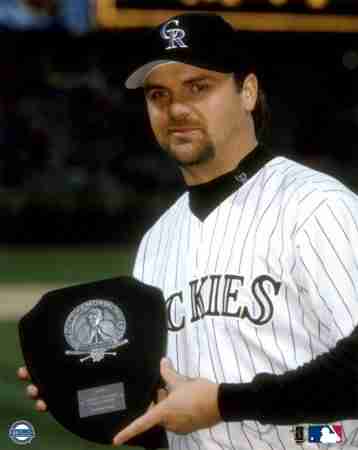
This is the twenty-fourth and final of our series where we here at Notinhalloffame.com, do what else? Debate the merit of twenty-four men on the most loaded Baseball Hall of Fame ballot in our lifetime.
Joining me, the site's Committee Chairman, in this debate are D.K. of the site's Phillies Archivist blog and Darryl Tahirali of the site's DDT's Pop Flies blog. This looks to be a very important part of our site, and we hope you will enjoy reading this as much as we enjoyed writing it.
Chairman: Every single time the Baseball Hall of Fame and Larry Walker are in the same sentence together, most bloggers, writers, pundits and fans counter with two words: Coors Field. While I think there is some legitimacy to that argument, this is a guy who still put up good numbers in Montreal, had good numbers on he road while with Colorado, and by the way these are the same guys (the writers) who talked about the Coors effect and voted him the MVP of the National League in 1997. Walker is on the 5th ballot, and last year he had his lowest total yet with 10.2%. On the surface, this is not a path to Cooperstown.
D.K.: Walker was a .320 career hitter until late in his career. If he had played one more season instead of retiring at age 37 he would have reached the 400 HR plateau. (Like Mussina, he apparently wasn’t interested in establishing a statistical legacy). Walker had some years where his batting average, on base percentage and slugging percentage, plus those two last categories combined were absolutely Crazy Good! However, the voting writers choose to look on this as just an aberration of having Coors Field as his home park.
I think the writers should re-examine Walker’s career rather than just dismissing his numbers as being, the product of having a great park to hit in.
Walker’s inability to attract votes also looms like an ominous dark cloud over the future candidacy of the greatest Colorado Rockie of them all, Todd Helton!
Darryl: I've been writing about Larry Walker since my first article for this site, and in my 2013 ballot evaluation I went into detail about Walker and the "Coors Effect." First, Walker played less than 30 percent of all his games at Coors, and his last two seasons of his nine total were after the Colorado Rockies began storing baseballs in a humidor to neutralize the park's altitude effects. Prior to coming to Colorado, Walker played five full seasons in Montreal's Olympic Stadium, and in three of those seasons the stadium was considered to be a pitchers' park. When Walker won the NL MVP in 1997, he posted a .346/.443/.733 slash line on the road, and he actually slugged better on the road—his home slugging percentage was .709 while he slugged .733 on the road—and he hit 29 of his 49 home runs that year in ballparks other than Coors Field. In short, Larry Walker could hit anywhere, he was a five-tool player, and he ranks 10th all-time among all right fielders according to Jay Jaffe's JAWS system. The nine ahead of him are all Hall of Famers while Walker is ahead of Hall of Famers Paul Waner, Sam Crawford, Tony Gwynn, Dave Winfield . . . Every year I repeat myself on this. Not that it will help Walker. The writers won't elect him.
Chairman: We are all on the same page, beating that dead horse. Walker could conceivably fall off the ballot this year and hardly anyone would care. The numbers bear everything out, the Coors advantage was proven statistically not to be as big an impact on his overall career as people think, but again the writer’s just don’t care, and the ones that do don’t seem to have any impact. He is going to stay on the ballot just so that we have this same discussion every year.
D.K: Walker was indeed a 5-tool player as Darryl attests. He could field and had an excellent throwing arm to cut down runners or to make them not even think about trying to stretch those singles into doubles.
The advanced statistics systems that have come into vogue recently bear out what I had always felt in my gut - that Walker could hit no matter where he played or how challenging a park’s dimensions might be.
Here’s hoping he gets a larger share of votes this year. Up to this point he has been about the most underrated and underappreciated candidates in recent writers’ ballots history.
Darryl: I think Larry Walker is a bellwether for players whose home park was Coors Field, and his fate will have an impact on Todd Helton when he becomes eligible, although Helton played his entire career in Colorado and Walker did not. The larger issue is with the Hall having to come to terms with this condition, as it has had to do so with the designated hitter and relief pitching, but, really, park effects should not be an issue for the Hall. Hall of Famer Chuck Klein raked like a monster in his home park, Philadelphia's Baker Bowl, but was an average hitter elsewhere. Walker was excellent anywhere. And while this closing remark comes from the emotional side, as a Canadian, albeit one long-transplanted to the States, I want to see a guy from British Columbia in the Hall of Fame!
Chairman: It breaks my heart on a fictional vote to say no (he is my 11B) so I can only imagine how awful I would feel if I had a real ballot; and yes it hurts me more as a Canadian!
D.K.: Walker ranked tied with Jeff Kent for 11th - meaning those two are near-misses under the current system. - NO. These two get my vote if the writers had been successful in getting the rules changed to allow a maximum of 12 votes per writer instead of 10.
Darryl: This is one of my protest votes, along with those for Barry Bonds and Roger Clemens, although in Larry Walker's case it was one of his home parks that was on steroids for a while, not he himself. I've been saying this for years: He is an effing Hall of Famer. My tenth and final Yes vote.
